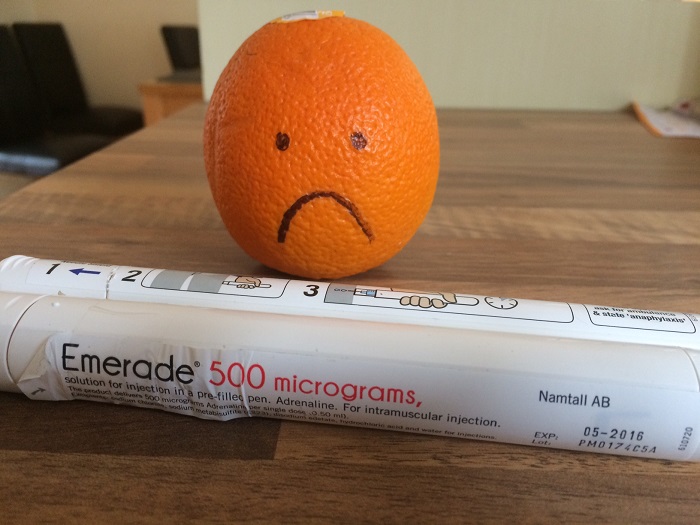If you follow the news you will have no doubt seen the recent pictures of the magician Dynamo. He took to social media to show the effects that the steroids used to fight his Crohns Disease, were having on his physical appearance. The photos showed the typical, bloated ‘moonface’ that many of us who are on, or have received steroid treatments, will know too well.
My Journey With Steroids
I, like Dynamo, suffer from Crohns Disease. I also have rheumatoid arthritis and iritis. For these three illnesses, steroids are commonly used to reduce the inflammation associated with a flare. My earliest experiences of steroids, as a child, were all injection based. I would regularly have intra-joint injections of steroids to help treat them when flaring with my arthritis. These injections, although unpleasant, would generally help settle down a joint that was giving me problems.
Aged seven I was diagnosed with iritis. This causes inflammation of the iris and common in children who have been diagnosed with arthritis. The treatment for this was steroid eye drops. Occasionally – apologies to the squeamish – I would also have them injected into my eyes.
My first experience of being given a course of steroid tablets is one I will never forget. I was 18 and having a severe flare of my iritis. My ophthalmologist thought that, alongside the eye drops, a course of steroid tablets would be needed to get it under control. Iritis can cause blindness, so it is important to get the flare sorted as quickly as possible. I was sent home on 80mg a day, never imagining the side effects that I would experience.
At the time I was working as a nursery nurse. I loved my job, and went straight back to it after my appointment was over and I had taken the first dose. That night, I barely slept but didn’t think much of it. When it happened the second and third night, I found myself getting more and more poorly. I felt like I was going crazy – no sleep and the worst feeling of being down that I had ever experienced. I finally went to see my GP and cried and cried. I didn’t know what was happening to my mind or body. He explained that the steroids I had been given were causing these symptoms and that I was on an extremely high dose. He signed me off work, slashed the dose down by half and got in touch with my ophthalmologist to follow me up ASAP.
At the time my knowledge was limited and not what it is now. I was so scared and also frustrated that these extremely common side effects had not been mentioned to me.
At the age of 22 and after having my first baby, I started having severe issues with my left hip. It wasn’t a joint (one of the only ones) that my arthritis affected and I was sent to orthopaedics to have it checked out. Turned out that the steroids over the years had caused a condition called avascular necrosis in my hip bone, basically killing off the blood supply to the majority of the ball part of the ball and socket joint. Aged 22 and a half I received a total hip replacement and one huge scar!
There was yet more to come. I had struggled with bowel problems since the age of 8 or 9, which were often put down to the medications I was on for my arthritis. Aged 26 these problems got much worse and I was sent for a colonoscopy and then diagnosed with Crohns Disease. The treatment to get my flare under control? You guessed it – a course of steroids.
I was put on 40mg to start with and then had to taper them down over the coming weeks. You can’t just stop taking steroids and have to drop your dose gradually in order to give your adrenal gland the chance to kick in and start producing cortisol by themselves again. Unfortunately, I had been on them almost continually since my second son had been born the year before as they couldn’t get my arthritis under control, and haven’t been off them since. Seven years and counting!
Living On Steroids
Steroids have ravaged my body, I also now suffer with ostopenia (the precursor to osteoporosis) due to my long term use of them. I struggle with insomnia and night sweats. I have needed cataract surgery for a cataract which was caused by the steroid eye drops I have used over the years to treat my iritis. I am on two other medications to help with the side effects of the prednisilone (the type of steroid I am on). During three major flares which have resulted in hospital stays, I have been hooked up to IV steroids. My appetite is huge and I have gained weight. And finally, after a severe flare last year and large doses of IV steroids on top of my tablets, I now have the dreaded moonface.
Somehow, being able to physically see the effects these medications have on you, right there every day in the mirror, makes it all so much harder to deal with. This is not to say that I am not grateful to the steroids I have been given over the years. They work wonderfully well at what they do, it’s just a shame, that for some, the side effects can be so numerous and severe. Unfortunately they are a necessary evil when suffering from auto-immune conditions as I am.
I am finally on a reducing plan to get me off the devil’s tic-tacs (Crohnsfighting’s perfect nickname for them) for good. Because of the length of time I have been on them, it may not be possible to stop them completely. For now I am on a very slow plan to wean my body off them. My sleeping is already improving although I am still struggling with the night sweats and increased appetite. For anyone on them, or asked to start them, here are my top tips for you –
- TAKE THEM IN THE MORNING – This is the best way to ensure they don’t interrupt your sleep
- WORK WITH YOUR DOCTOR ON A REDUCING PLAN – Have a clear plan in place when you are put on the steroids. Know how much you are taking, and when to lower the dose
- SIDE EFFECTS – Make sure your doctor also prescribes a calcium supplement to help protect your bones and something to protect your stomach (I am on Omeprazole but there are a couple of others that can be used for people who cant have that)
- MOOD CHANGES – Steroids can alter your mood so see your doctor ASAP if you experience this and are struggling mentally
- NEVER JUST STOP TAKING THEM – It’s dangerous! Your body needs to wean off them slowly. If you are struggling with side effects, see your doctor as soon as possible rather than just stopping taking them and they can advise on what to do
Check out my poem – ’10 Things I Hate About Pred’ over on my blog, The Spoonie Mummy
The post Living On Steroids appeared first on talkhealth Blog.










 slow down and take better care of themselves so they can feel lighter, more peaceful, and in charge of their lives. She is also founder of the site
slow down and take better care of themselves so they can feel lighter, more peaceful, and in charge of their lives. She is also founder of the site